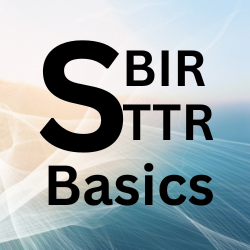Securing a grant through the Small Business Innovation Research (SBIR) or Small Business Technology Transfer (STTR) programs is a significant milestone for any small business. These programs provide essential funding to support research and development (R&D) in high-tech fields, enabling companies to bring their innovative ideas to life. However, as companies engage in the grant application process, a question often arises: Can we pay contingent fees to grant writers from our SBIR or STTR grant funds?
At first glance, paying a grant writer contingent fees—where the compensation depends on winning the grant—may seem like a good deal. After all, it aligns the interests of the business and the grant writer. This seemingly straightforward proposition creates a web of ethical and regulatory concerns and could create serious business risks.
This article explores the implications of paying contingent fees to grant writers using SBIR or STTR funds.
Understanding Contingent Fees and SBIR/STTR Grants
A contingent fee arrangement typically involves paying a grant writer or consultant a fee dependent on the successful acquisition of a grant. If the business receives the grant, the writer earns a pre-determined percentage, typically 10-15%, with no fee if denied.
While this arrangement may seem practical, SBIR and STTR rules strictly govern fund usage and define allowable expenses. These regulations ensure that taxpayer money is spent appropriately and transparently.
Key Issues with Paying Contingent Fees from SBIR/STTR Funds
Compliance with Federal Regulations
Paying contingent fees to grant writers with SBIR or STTR funds could violate federal regulations. The Small Business Administration (SBA) guidelines specify SBIR and STTR funds support research, development, and commercialization, not consultant fees tied to success.
The Federal Acquisition Regulation (FAR), which governs the use of federal funds, generally prohibits paying contingent fees or commissions for obtaining government contracts. The reasoning is simple: the government wants to avoid incentivizing consultants to inflate costs or misrepresent the project to secure a higher fee. In other words, a contingent fee compensation does not align with the intended use of SBIR or STTR funds.
Contingent Fees Create Conflict of Interest (COI)
Paying a contingent fee to a grant writer can also create a potential conflict of interest. The goal of any grant writer should be to help a business craft the best possible proposal that aligns with the objectives of the SBIR or STTR programs. Compensation tied to securing funding may incentivize the writer to prioritize getting the grant at any cost.
A COI could lead to:
- Misleading or inflated representations in the proposal in an attempt to secure the funding.
- Misaligned project goals occur when the proposal is crafted to maximize the chances of winning the grant instead of focusing on the business’s actual needs.
- Short-term thinking: The grant writer may focus on a quick win rather than laying the groundwork for a long-term relationship with the business or ensuring the project’s sustainability.
These issues can not only jeopardize the quality of the proposal, but they can also raise significant ethical concerns that could harm the business in the long run.
Risk of Reputational Damage
Federal agencies highly scrutinize SBIR and STTR proposals. A proposal that includes any signs of misrepresentation, misleading claims, or unethical conduct could raise red flags during the review process. Red flags could result in:
- Rejection of the proposal.
- Audit or investigation into the business’s practices.
- Damage to the company’s reputation can have long-lasting effects on future funding opportunities.
Businesses that use contingent fee arrangements risk attracting negative attention from funding agencies, which could make it harder for them to secure future grants—whether under SBIR, STTR, or other federal programs.
Potential for Overinflated Fees
Another consideration is that contingent fees often come with a high price tag—sometimes as much as 10-15% of the total grant amount. When a business uses SBIR or STTR funds to pay these fees, it may inadvertently divert funds from the company-funded project expenditures, reducing the amount available for actual R&D work. Sometimes, this could make the project less effective or delay its development, ultimately hindering the business’s long-term goals.
Alternatives to Contingent Fees
While paying contingent fees directly from SBIR or STTR grants is not advisable, there are other ways small businesses can seek assistance in preparing competitive proposals without running afoul of the rules:
Fixed-Rate Contracts: Businesses can hire grant writers or consultants on a fixed-rate basis instead of a contingent fee arrangement. Fixed-rate agreements ensure payment is for the service provided rather than dependent on winning the grant. SBIR and STTR grant rules typically allow these costs under the consultant and professional services category.
- In-Kind Contributions: Some businesses partner with universities, research institutions, or organizations with the necessary grant-writing expertise. In these cases, the partner may contribute in-kind services to help prepare the proposal. While this doesn’t involve direct financial compensation, it provides access to valuable expertise without violating rules.
- Seek Funding for Grant Writers: Some funding agencies and private organizations offer non-contingent funding for hiring consultants to assist with SBIR or STTR proposal preparation.
- Businesses can seek these funds to help cover the cost of professional grant writing assistance without violating SBIR/STTR regulations.
- Grant Writing Assistance Programs: Many states and organizations offer grant writing assistance programs to small businesses, often at a reduced cost or even for free. Leveraging these resources can help companies submit high-quality proposals without resorting to contingent fees.
Conclusion: Ethical and Legal Considerations Matter
The SBIR and STTR programs provide essential funding for small businesses to support R&D activities, not pay for contingency-based compensation arrangements.
Paying grant writers on a contingent fee basis with these funds could lead to legal, ethical, and financial risks that far outweigh any short-term gain. Businesses should prioritize compliance with federal regulations and engage in transparent, ethical business practices when seeking assistance with their proposals.
By seeking fixed-rate arrangements, in-kind contributions, or grant-writing assistance programs, businesses can ensure they adhere to the rules while benefiting from expert support in crafting competitive proposals. After all, in the world of government funding, integrity is just as important as innovation.
References:
- U.S. Small Business Administration (SBA). (2021). SBIR/STTR Policies and Guidelines. Retrieved from https://sbir.gov
- U.S. Federal Acquisition Regulation (FAR). (2021). Contingent Fees and Prohibited Practices. Retrieved from https://www.acquisition.gov

